Risk 'n' chips
China's been mostly quiet on the Biden administration's massive policy shift on 'chokehold technologies' but expect some fireworks after the Party Congress
Photo: Brian Kostiuk; Unsplash.
On October 7, the Biden administration made its biggest move so far on semiconductor exports to China. Coming close on the heels of the passage of the September CHIPS Act, there can now be no uncertainty about US resolve to be first-mover when it comes to so-called “chokepoint” technologies.
Whether it’s too late and will simply spur China to go it alone is another argument. The point is the message: we’re not abetting a fast-emerging enemy that avowedly has no truck with the liberal world order.
The The Center for Strategic & International Studies (CSIS) has a good backgrounder of what’s at stake:
The most important chokepoints in the context of this discussion are AI chip designs, electronic design automation software, semiconductor manufacturing equipment, and equipment components. The Biden administration’s latest actions simultaneously exploit U.S. dominance across all four of these chokepoints. In doing so, these actions demonstrate an unprecedented degree of U.S. government intervention to not only preserve chokepoint control but also begin a new U.S. policy of actively strangling large segments of the Chinese technology industry—strangling with an intent to kill.
Reducing the US move to its nuts and bolts, both the US and China believe that AI technology is critical to future power competition – economically and militarily – and the US is particularly unnerved by China’s strategy of “military-civil fusion.”
The Biden administration is essentially saying to China: “If your policy is military-civil fusion, then the only realistic way of implementing our policy of no military end use is to end all sales to China, and we are now willing to take that step.”
This would normally evince an extraordinarily loud squeal of hurt feelings from China, but the move has come on the eve of a particularly important once-every-five-years Party Congress, so the remonstrations are on hold.
But The Wall Street Journal reports, US “chip-equipment suppliers are pulling out staff based at China’s leading memory-chip maker and pausing business activities there
State-owned Yangtze Memory Technologies Co. [YMTC] is facing a freeze in support from key suppliers including KLA Corp. … and Lam Research Corp. … The U.S. suppliers have paused support of already installed equipment at YMTC in recent days and temporarily halted installation of new tools, the people said. The suppliers are also temporarily pulling out their staff based at YMTC, the people said.
‘I believe the U.S. government intends to force the more advanced production facilities of Chinese companies like SMIC and YMTC to shut down entirely,’ Gregory Allen, a senior fellow at the Center for Strategic and International Studies, said. ‘However, the more advanced Chinese production facilities of South Korean and other internationally-owned companies will merely be prevented from expanding beyond their current production footprint.’
The US is making its move while it’s still ahead – it has a combined share of 41% of the semiconductor chip supply chain compared to China’s 5% or lower, according to a Boston Consulting Group analysis, the Wall Street Journal reports.
The risk is, of course – just as a cornered Putin is threatening the use of nukes – a cornered China that’s prepared to take an all-or-nothing territorial gamble on Taiwan, effectively “nuking” the high-end chip sector.
Anti-Xi banner unfurled in Beijing
Photo: Twitter, likely via Weibo.
Social media was awash yesterday (Thursday) with photos and video of a banner unfurled on Sitong Bridge, near the Haidian Campus of Renmin University in northwestern Beijing, calling for strikes and an end to Xi Jinping’s dictatorial rule.
The perpetrator – dressed in a hardhat and the orange outfit of a construction worker – lit a fire on the bridge to draw attention. He was arrested by police and hustled away, as censors valiantly fought to hold back a tide of social media interest – and in many cases support.
On one of the two banners, in the characteristic red of Chinese public slogans, were the words: “Depose the Traitorous Dictator Xi Jinping.”
On the other: “We Don’t Want Nucleic Acid Tests, We Want Food; We Want Freedom, Not Lockdowns, We Want Votes, Not Leaders; We Want Dignity, Not Lies; We are Citizens, not Slaves.”
In a phone call, exiled dissident and Taiwan parliamentary representative for human rights Wu’er Kaixi told ChinaDiction:
‘China is not what the West thinks it is; the dissent is usually silenced – you only hear the 50-centers, the pinkies. I think that the dissent is the majority, but it took a very brave man to express it.
‘What is the real state of public opinion? You can’t take it face value, because you only get sanctioned news and social media commentary, but you can deduce it’s far from what you are being led to believe.’
State media has the big Party Congress covered
The event will start on Sunday, but the Global Times had it covered in essence by Wednesday as the observant reader will note above.
There will be more to the grand occasion than Xi, of course – a new Politburo etc. But don’t expect any surprises, and as for the inclusion of “liberal” leaning CPC elders, there aren’t any.
Yes, the Western media has, for example, seized on Wang Yang, who embraced some market reforms in Guangdong Province a decade ago, but he’s also headed a consultative committee on Xinjiang and has toed the line under Xi since his Guangdong days.
As The Economist puts it, this is Xi’s show, and after …
… ten years of Mr Xi, ‘I don’t think many people harbour the illusion that he’s going to unleash a wave of productivity-enhancing economic reforms with drive and vigour,’ says Andrew Batson of Gavekal Dragonomics, a consultancy in Beijing. But some nevertheless hope for a restoration of ‘pragmatism’, he says. They believe Mr Xi’s economic team can smooth his rougher edges and ensure orderliness in his policymaking. Their job is to stop him “dashing around on campaigns to promote this and crack down on that”.
No one needs a crystal ball to know that after the party congress this month, Xi Jinping will be the first name on the economic team sheet. From the policymakers that join him, investors expect not reform but restraint.
It’s a tall order. China may not be in a death spiral, but it certainly seems about to cement policies developed under Xi that prioritize ideology over the economy and the self-induced catatonia imposed by “dynamic cleansing” – or zero-Covid – looks set to continue.
Elon slams Taiwan, gets tax break in China
Great catch by Matt Stoller … Pure coincidence of course, the Musk support for a China-administered Taiwan and the tax break …
The Greater Sinosphere
Hong Kong
Faltering steps on inbound tourism
Photo: tam wai, @samtillo: Unsplash.
As Taiwan opens up its borders to foreign travelers – actually, it did so yesterday (Thursday) – the South China Morning Post reports that Hong Kong plans to keep testing all incoming human traffic – and frequently and for as long as it takes.
Sources revealed that Chief Executive John Lee Ka-chiu had asked all bureaus during a recent internal meeting to promote the current “0+3” arrangement, under which inbound travellers must undergo a three-day medical surveillance period.
The insiders said that implied the government was unlikely to further lift travel curb restrictions.
The news – as murky as it is – comes as Taiwan yesterday opened its borders to foreign travelers, who are allowed freedom of movement in a seven-day, self-monitoring trust system, reports AFP.
Three days of hotel quarantine have been replaced with seven days of “self-monitoring” where tourists are expected to keep an eye on their health and wear face masks indoors and outdoors.
The system will operate largely on trust, with tourists given coronavirus test kits on arrival to use throughout their stay.
Students suspended for disrespecting national flag
Respect it or else. Photo: Aboodi Vesakaran; Unsplash.
A Tsuen Wan secondary school confirmed early this week that 14 students were suspended for disrespecting “the national anthem by failing to turn up for a flag-raising ceremony,” reports Radio Free Hong Kong (RFHK).
St Francis Xavier's School said that besides failing to attend the assembly on Wednesday, the pupils had "committed disrespectful acts", without providing further details.
Speaking on Commercial Radio on Tuesday, education sector lawmaker Chu Kwok-keung said class suspension was a "quite serious" penalty.
Taiwan
Blow up TSMC? No need!
TSMC’s Fab 12B by night. Photo: 曾成訓; Creative Commons Attribution 2.0.
Amazingly, this story, as reported most recently by Bloomberg, is still doing the rounds.
No, there will be no need to blow up Taiwan’s semiconductor foundries if China invades. They’re so sensitive and dependent on global supply chains that the entire semiconductor sector would likely be the first major casualty of the war.
Chen Ming-tong (Chén Míngtōng, 陳明通), director-general of Taiwan’s National Security Bureau, said:
‘If you understand the ecosystem of TSMC, the comments out there are unrealistic … TSMC needs to integrate global elements before producing high-end chips. Without components or equipment like ASML’s lithography equipment, without any key components, there is no way TSMC can continue its production.
‘Even if China got a hold of the golden hen, it won’t be able to lay golden eggs,’ he added.
The backstory to Chen’s remarks were parliamentary questions about rumors the US would destroy TSMC in the event of an attack by China – or at the very least “evacuate TSMC’s chip engineers.”
Vivek Ramaswamy and Mike Pompeo opine in the Wall Street Journal:
Taiwan’s primary defense is its economic influence, not its military. The country’s dominant position in the semiconductor industry—what President Tsai Ing-wen calls Taiwan’s “silicon shield”—serves as a useful protection against Chinese aggression. The Taiwan Semiconductor Manufacturing Co. produces more than half of the world’s advanced semiconductors and 90% of the most advanced chips. TSMC is the exclusive producer of the most advanced semiconductors that power Apple’s iPhones, AMD’s advanced CPUs and Qualcomm’s snapdragon chip used in many Android phones.
If China were to invade Taiwan, TSMC’s lights would likely go out. “If you take a military force or invasion, you will render the TSMC factory inoperable,” TSMC chairman Mark Liu told CNN in July. A material disruption to the industry would send shock waves across global supply chains, rendering manufacturers unable to make everyday products.
Local commentator on Taiwan issues Courtney Donovan Smith, however, has recently taken issue with the “silicon shield myth” in the Taiwan News, arguing, sure, the global economy pretty much runs on Taiwan-made silicon chips these days and China would hurt as much as – if not more than – everyone else were chip production to stop overnight.
But what if, Smith asks, Xi Jinping’s China really is deprioritizing its economy in favor of “grand rejuvenation of the nation” – as imagined in Chinese communist triumphalist terms – first?
The genocide in East Turkestan (Xinjiang) and the sanctions that came with it, the wholesale destruction of the cram school industry and the crackdown on big tech companies are all examples. Then there is the “dynamic zero Covid” policy, which has repeatedly shut down whole swathes of the economy, snarling supply chains worldwide and crushing many small service businesses.
The CCP has also, through a combination of brutal crackdowns and the zero-Covid policy, led to Hong Kong losing its top spot as Asia’s premier financial hub to Singapore. Chairman Xi will damage the economy as he sees fit, based on his priorities.
It’s a “don’t look up” scenario, as the Netflix-inspired saying goes, but also a good reminder of what exactly is at stake when we talk about “cross-strait tensions” – pretty much the global order as we know it.
Chinese pigs caught crossing the Median Line
The threat to Taiwan is not merely military.
United Daily News (UDN, Chinese language) reports that as Taiwan swings open its doors to foreign tourists, the risk of pork products affected by African swine fever is likely to increase too.
The Taiwanese daily notes that equally worrying is the fact that Chinese ships carrying pork products from China's epidemic areas frequently cross the Median Line.
According to UDN, Taiwan authorities have already confiscated “dozens of tons” of pork from Chinese ships recently.
Meanwhile, tourists to Taiwan are reminded that bringing pork products into the country will result in a NT$20,000 (US$630) fine for first-time offenders.
New, smaller frigates for Taiwan
Smaller is better, according to Taiwan’s embrace of asymmetric warfare, in this case as broadcast by TaiwanPlus, Taiwan’s new 24-hour English-language news channel/website, which we’ve been touting here at ChinaDiction because it’s something Taiwan has been trying to do for at least two decades – until now unsuccessfully.
Full disclosure, ChinaDiction was involved in one of the earlier state-funded less-than-successful attempts at daily English-language TV news during the Chen Shui-bian (Chén Shuǐbiǎn, 陳水扁) period.
Taipei metro to provide sanitary products for women
Photo: Public domain.
The Taipei metro line is set to begin trialling free sanitary products for women next month, “spurred by a recent push in some neighboring Asian countries to tackle ‘period poverty’," reports AFP.
Starting November 1, the Taipei Rapid Transit Corporation will provide menstrual products on request at 20 of its busiest stations along the metro line that runs through both the capital and neighboring New Taipei City.
"We will re-evaluate and adjust in accordance with the results of the trial and the feedback," the subway operator said in a statement.
The trial was given the go-ahead after several city councillors proposed that Taipei should follow moves overseas, including in Japan and South Korea, to increase free access to sanitary products.
Coda
The ‘Crazy Friday Guy’
Taiwan is no stranger to eccentric politicians – some of them very successful – but Tainan mayoral candidate Mark Lin (Lín Yìfēng, 林義豐), who is running as an independent, is in a league of his own.
It’s not his first time. The construction company owner, who frequently campaigns on beaches in swimwear and promises Crazy Friday parties for young people with international DJs, ran for Tainan mayor in 2018 – and lost.
He’s back – and unforgettably mad as ever, still promising parties and also affordable housing for young people.
New Bloom, an English-language web magazine in Taiwan, has an article on his 2018 campaign, perhaps making heavy weather of the political ramifications of Lin’s antics in Taiwan’s deep South, but entertaining reading all the same – and the perfect antidote to the buttoned-down, over-rehearsed tedium of what’s passing for politics in Beijing this weekend.
This week in history
China tests its first atomic bomb
Photo: New York Times.
OK, it was on October 16, but close enough, and it made a big bang back in 1964.
Miss Qiu, the Chinese called the bomb, and she blew according to plan at 3pm in unpopulated Lop Nur, Xinjiang Uyghur Autonomous Region. The world was unsurprised at the time, but it was a massive project against great odds, given the Soviet Union had withdrawn aid to China and the country was in the midst of Mao Zedong’s disastrous Great Leap Forward, during which tens of millions starved to death.
Those deaths amid a drive to build the ultimate weapon of mass destruction are worth pondering on when Beijing projects its messages about putting people first, as it has been the contemporary zero-Covid lockdowns.















